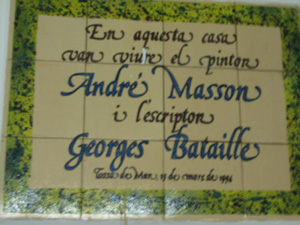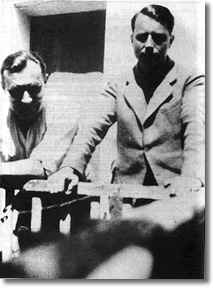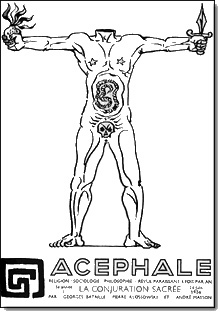June 13, 2005
Acephalia

The other night, we dined at a restaurant in front of the walls of the old fortifications of Tossa de Mar. I looked up, and there was a plaque...
...what luck!
I google:

Check this out:
What I have thought or represented, I have not thought or represented alone. I am writing in a little cold house in a village of fishermen: a dog has just barked in the night. My room is next to the kitchen where Andr? Masson is happily moving around and singing; at this very moment, as I write, he has just put on the phonograph a recording of the overture to Don Giovanni; more than anything else, the overture to Don Giovanni ties my lot in life to a challenge that opens me to a rapturous escape from the self. At this very moment, I am watching this acephalic being, this intruder composed of two equally excited obsessions, become the ?Tomb of Don Giovanni.?
Masson and Bataille - Tossa, April 1936
When, a few days ago, I was with Andr? Masson in this kitchen, seated, a glass of wine in my hand, he suddenly talked of his own death and the death of his family, his eyes fixed, suffering, almost screaming that it was necessary for it to become a tender and passionate death, screaming his hatred for a world that weighs down even on death with its employee?s paw?and I was no longer able to doubt that the lot and the infinite tumult of human life were open to those who could no longer exist as empty eye sockets, but as seers swept away by an overwhelming dream they could not own. - Tossa, 29 April 1936 [Stoekl translation]

Why acephalia?
What language.
What rapture.
UPDATE I:
I click over to iTunes and buy the overture to Don Giovanni from the music store. As I reply by email to my friend Rabbi Milkblood concerning a mutual project, I think of all my artist friends and what they must be doing this very moment and of all the great times we've had hanging out, talking about art and life. Food and drink and conversations roaming.
Seagulls squawk overhead.
"...not thought or represented alone..." indeed.
UPDATE II:While listening to this, I googled towards the French Revolution and I found this:
Mozart's other operatic masterpiece Don Giovanni, the librettist of which was also Da Ponte, is based on the Spanish theme of Don Juan, which, in various forms, had appeared in literature many times since it first appeared as El Burlador de Sevilla by Tirso de Molina, in 1630. Here the same subject matter that we found in Figaro is dealt with in far more sombre colours, and in greater depth and complexity. The dark colours of this work are evident from the first portentious and threatening bars of the overture. Don Giovanni, like the Count, is a rake, but he is much more than this: he is also a rebel who rejects all social and moral norms. There is an element of anarchy running through this opera, an intuition of the crumbling of the existing social and moral order.Posted by Dennis at June 13, 2005 11:14 PM
Leave a comment